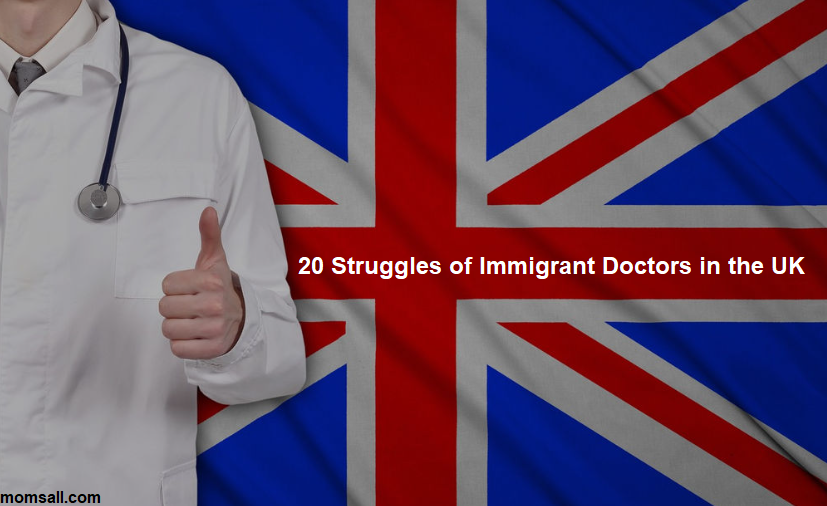Becoming a doctor is a highly sought-after profession worldwide. It takes years of hard work, dedication, and skill to qualify as a doctor, and once qualified, doctors can earn a good salary and have job security. However, for immigrant doctors in the UK, the path to practicing medicine can be a challenging and complex journey. In this blog post, we will explore the struggles of immigrant doctors in the UK and provide answers to some common questions.
- Is It Worth Being a Doctor in the UK?
- Is It Easy for Doctors to Immigrate to the UK?
- What Barriers Do Migrants Face in Accessing Healthcare in the UK?
- What Proportion of the UK's Doctors are Immigrants?
- How Can a Nigerian Doctor Move to the UK?
- Which Country is Easiest for Doctors to Immigrate?
- 20 Struggles of Immigrant Doctors in the UK
Is It Worth Being a Doctor in the UK?
The UK is a highly sought-after location for doctors to practice medicine. The UK has a well-respected healthcare system, and doctors can earn a good salary and have job security. However, the process of becoming a doctor in the UK can be challenging for immigrant doctors. This is due to various factors such as language proficiency, cultural barriers, and a different healthcare system.
ALSO READ: Signs You Should Quit Your UK Job – 10 Reasons to Quit Your UK Job
Is It Easy for Doctors to Immigrate to the UK?
It is not easy for doctors to immigrate to the UK. The UK has strict immigration rules that require doctors to meet certain criteria to be eligible to work in the UK. Doctors who wish to practice medicine in the UK must meet specific qualifications and language proficiency requirements, pass the General Medical Council (GMC) exams, and obtain a work visa.
What Barriers Do Migrants Face in Accessing Healthcare in the UK?
Migrants face several barriers to accessing healthcare in the UK. One of the most significant barriers is language proficiency. Many immigrants do not speak English as their first language. This makes it difficult for them to communicate with doctors and understand medical terminology. Additionally, immigrants may face cultural barriers and discrimination that can make it challenging for them to access healthcare services.
ALSO READ: NMC UK Introduces IELTS /OET Test Combining Calculator
What Proportion of the UK’s Doctors are Immigrants?
According to the General Medical Council (GMC), approximately one-third of doctors in the UK are immigrants. The GMC regulates all doctors in the UK, whether they are UK graduates or international medical graduates.
How Can a Nigerian Doctor Move to the UK?
Nigerian doctors who wish to move to the UK must follow specific steps. They must first obtain a medical degree from a recognized Nigerian medical school. Next, they must pass the GMC exams, which include a language proficiency test, and obtain a work visa. Nigerian doctors must also meet specific requirements for their qualifications to be recognized in the UK.
ALSO READ: How to Move to The USA as a Medical/Clinical Lab Scientist: Here is the Kind of Visa You Need
Which Country is Easiest for Doctors to Immigrate?
The ease of immigrating as a doctor varies by country. Some countries have a shortage of doctors, making it easier for international medical graduates to practice medicine. Other countries have strict immigration policies and require doctors to meet specific requirements. Australia, Canada, and the United States are popular destinations for immigrant doctors due to their high demand for medical professionals.
20 Struggles of Immigrant Doctors in the UK
- Language proficiency: Immigrant doctors must have a high level of English proficiency to practice medicine in the UK.
- Cultural barriers: Immigrant doctors may face cultural barriers that make it difficult to communicate with patients and colleagues.
- Discrimination: Immigrant doctors may experience discrimination based on their race, ethnicity, or nationality.
- GMC exams: Immigrant doctors must pass the GMC exams, which can be challenging due to language barriers and a different healthcare system.
- Qualification recognition: Immigrant doctors must have their qualifications recognized by the GMC, which can be a complex and lengthy process.
- Work visa: Immigrant doctors must obtain a work visa to practice medicine in the UK.
- Job Availability: Immigrant doctors may struggle to find job opportunities due to competition and a lack of available positions.
- Pay disparities: Immigrant doctors may face pay disparities compared to their UK counterparts.
- Professional networks: Immigrant doctors may struggle to build professional networks due to cultural barriers and discrimination.
- Lack of support: Immigrant doctors may feel unsupported and isolated in their new environment.
- Adjustment to a new healthcare system: Immigrant doctors must adjust to a different healthcare system, which can be challenging.
- Adapting to new technology: Immigrant doctors may have to learn how to use new technology that they did not have access to in their home country.
- Long working hours: Doctors in the UK work long hours, which can be particularly challenging for immigrant doctors who are adjusting to a new environment.
- Work-life balance: Immigrant doctors may struggle to balance their work and personal life due to the demands of the profession.
- Emotional toll: Immigrant doctors may experience emotional stress due to being away from family and friends and adjusting to a new environment.
- Financial challenges: Immigrant doctors may face financial challenges due to the cost of living in the UK and the cost of obtaining a work visa.
- Limited career progression: Immigrant doctors may have limited opportunities for career progression due to competition and a lack of available positions.
- Revalidation process: Doctors in the UK must go through a revalidation process every five years, which can be challenging for immigrant doctors.
- Continuing professional development: Immigrant doctors must participate in continuing professional development, which can be challenging due to language barriers and a different healthcare system.
- Retention rates: Immigrant doctors may have lower retention rates due to the challenges they face, which can lead to a shortage of doctors in the UK.
ALSO READ: Are Nurses From Ghana and Nigeria Still Needed in the UK?
In conclusion, immigrant doctors in the UK face numerous struggles. They include; language proficiency, cultural barriers, discrimination, and a complex immigration process. Despite these challenges, many immigrant doctors continue to pursue their dream of practicing medicine in the UK. It is essential that the UK healthcare system provides support and resources to immigrant doctors to ensure their success and to address the shortage of doctors in the country.





